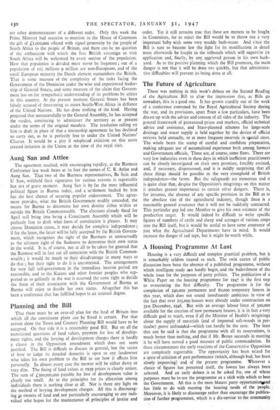The Future of Agriculture
There was nothing in this week's debate on the Second Reading of the Agriculture Bill to altar the impression that, as Bills go nowadays, this is a good one. It has grown sturdily out of the work of a conference convened by the Royal Agricultural Society during
the war, and its provisions, apart from a few particulars, have been drawn up with the advice and consent of all sides of the industry. The general framework of guaranteed prices and markets, official technical advice and assistance, and State-planned schemes for large-scale drainage and water supply is held together by the device of official reviews held annually, or at more frequent intervals in special cases. The whole bears the stamp of careful and confident preparation, making adequate use of accumulated experience both among farmers and Government officials. There are, of course, some flaws. There are very few industries even in these days in which inefficient practitioners can be closely investigated on their own premises, forcibly assisted; and, if necessary, dispossessed, and it is mildly surprising that all these things should be possible in the very stronghold of British independence—the farms. But the safeguards are numerous and it is quite clear that, despite the Opposition's misgivings on this matter it attaches greater importance to certain other dangers. There is, for instance, the absence of any specific provision in the Bill as to the absolute size of the agricultural industry, though there is a reasonable general assurance that it will not be suddenly contracted. This particular gap led one Member to give his own estimate of the production target. It would indeed be difficult to write specific figures of numbers of cattle and sheep and acreages of various crops into the Bill itself, but it would be useful to have some assurance of just what the Agricultural Departments have in mind. It would increase the danger of red tape, but it might be worth while.


































 Previous page
Previous page